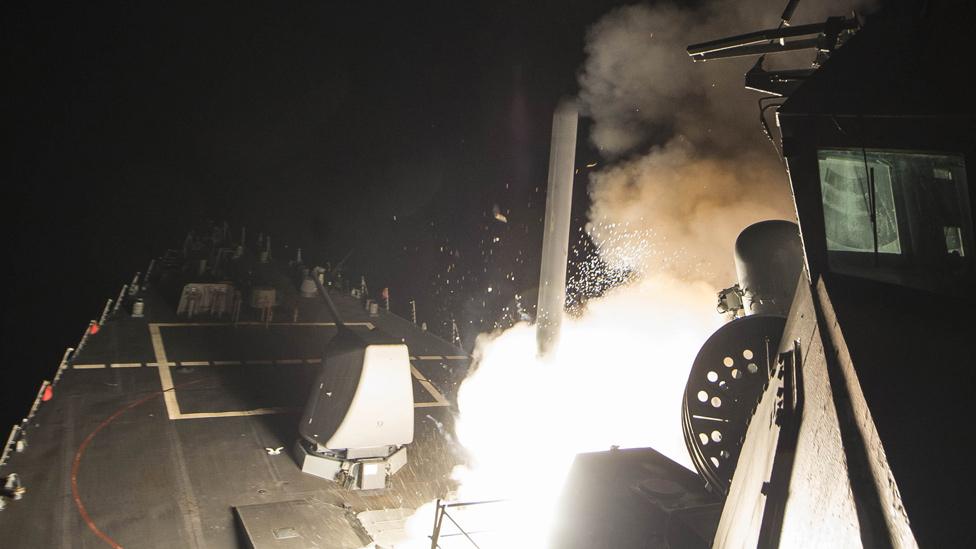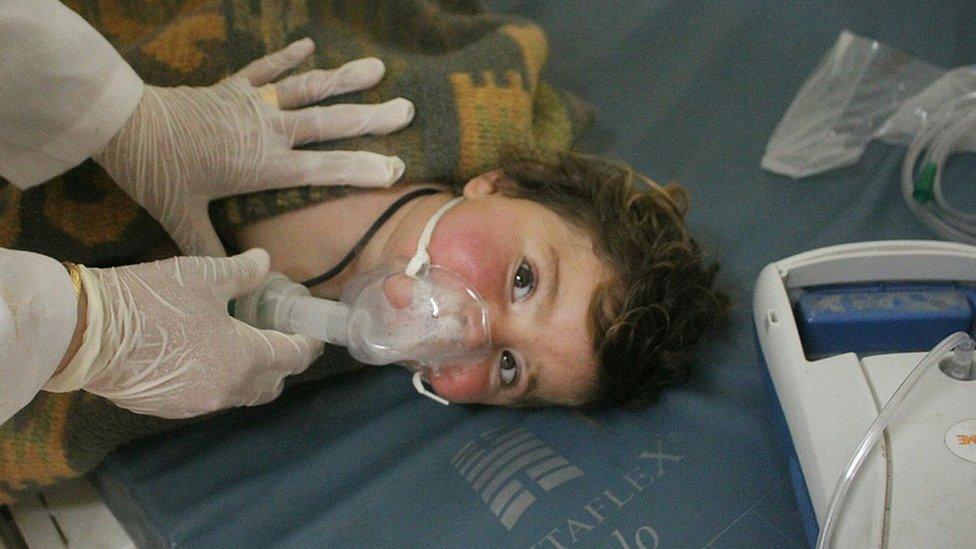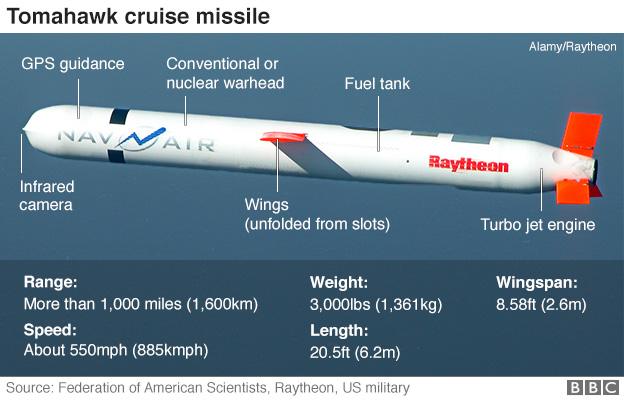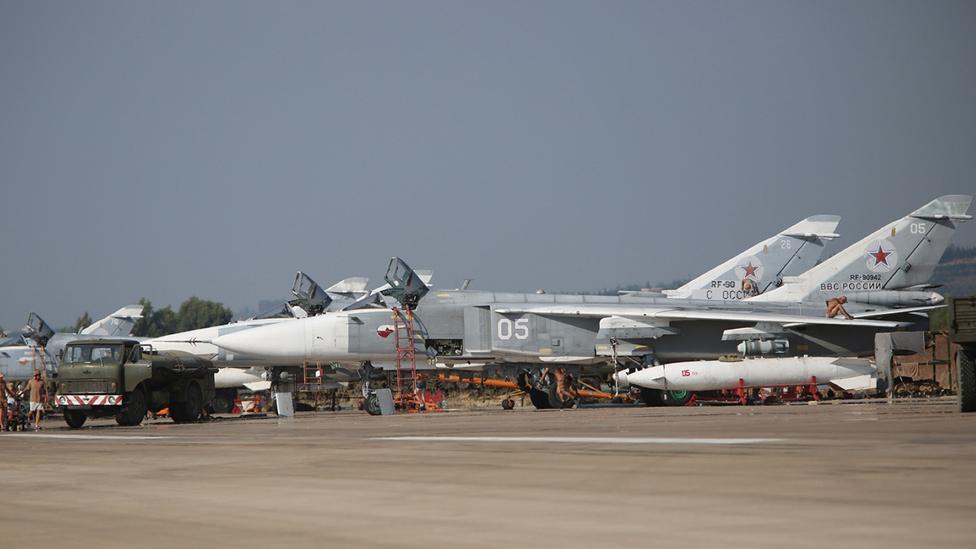Syria war: US missile strike leaves Russia bruised
- Published

The US missile launch is a show of force, after months of Russia doing the same in Syria
"Be careful what you wish for", the old saying goes - and this is exactly what the Russian leadership must be thinking right now.
The Kremlin's dreams of a US-Russian rapprochement under President Donald Trump were shattered by the American Tomahawk cruise missiles slamming into the Syrian air base. One might add another piece of advice: "Choose your allies carefully".
It is an unexpected reversal of fortune for Russia and President Vladimir Putin.
Only a few days ago US Secretary of State Rex Tillerson said that removing Syria's Bashar al-Assad from power was no longer Washington's priority. This was probably taken by the Syrian president as carte blanche to step up his attacks on the opposition. But the chemical attack on the town of Khan Sheikhoun - believed to be the work of his forces - backfired.
Even if one sets moral considerations apart (and this was a war crime, pure and simple), Moscow's credibility among the leading players in the region is dented now.
Either: Moscow knew about the planned attack and condoned it - which means its co-sponsorship with the US of the 2013 Syrian chemical weapons liquidation deal was a ruse, a deception, and it therefore cannot be trusted;
Or: the Assad regime deceived Russia and kept some of its chemical weapons (or production facilities) hidden, to use them at will. Then it means that the Kremlin has zero leverage on Damascus. In the hard-power world of the Middle East one doesn't know which outcome is more damaging for Russia.

Children were among the dozens killed or injured in the Syrian gas attack on 4 April
Two US destroyers casually launched 59 cruise missiles, worth nearly $1m (£m) each, just to make a political point. That underlines the discrepancy in financial and material resources between the US and Russia.
Trump sends a resolute signal on Syria
Why was Syria's Shayrat airbase bombed?
Six decisive points that changed Syria's war
The fact that the Americans told Moscow in advance about the strike, to avoid casualties among Russian military personnel stationed on the airbase, only added insult to injury. The message was unmistakable: "Step aside please while we do our own thing here."

The Trump administration is prepared to act unilaterally in the volatile region, where many are tired of Washington's eight years of inaction and long for a US "return".
Donald Trump showed that he, unlike Barack Obama, is not only prepared to draw "red lines" but is also ready to punish those who cross them.
US toughens stance
Key American allies in the Middle East - Israel, Egypt, Jordan and Turkey - roundly praised his action. In the absence of a coherent policy by the Obama White House these states visibly moved towards strengthening ties with Moscow.
However, in the last few weeks President Trump, Secretary of State Tillerson and Defense Secretary James Mattis have held intensive talks with these countries to re-establish confidence in US policies.

Su-24 bombers at Hmeimim airbase: Russia sent dozens of warplanes to help President Assad's forces
Probably the most unpleasant thing for Mr Putin is Turkey's approval of the US strikes. The Russian leader made a big personal effort to forge an alliance between Russia, Iran and Turkey, to help impose the Russian vision of future Syrian conflict resolution, which would keep the Assad regime intact. Now it looks as if Turkish President Recep Tayyip Erdogan has started playing a different game.
President Trump said he took the decision to launch a strike based on humanitarian grounds, after seeing images of gassed children. Whether it is true or not, such an attitude will earn him support in Europe, where such considerations are important. That's bad news for Moscow.
Mr Putin doesn't like - and doesn't know how to talk about - "values". He prefers "interests".
Setback for Putin
Although the White House said the strikes were a "one-off" action it looks as if a full-scale return of the United States to the Middle East is being considered by Mr Trump and his top advisers. It doesn't look like the White House will consult the Kremlin about the terms of this return.
Moreover, it seems very likely that putting pressure on Russia's top ally Iran may be next on the cards for Washington.
Domestically the Kremlin will redouble propaganda efforts by its massive state TV machine to convince the population that Russia is in the right and that the Americans are once again out to get it. Presidential elections are due in 2018 in Russia. In Mr Putin's view, nothing works as well as anti-Americanism and great power rhetoric to mobilise the electorate.
For the US and Middle East the Kremlin will most likely adopt the old Soviet-style policy of mixing threats with softer language, hoping to reach an accommodation that could be presented domestically as a "victory". It did work with the Obama White House. It might not with the Trump administration.
After all, no one promised that "making America great again" would mean sharing that greatness with others.
Konstantin Eggert MBE is a political commentator and host for TV Dozhd, external (TV Rain), an independent Russian TV channel. Previously he was Moscow bureau chief for the BBC Russian Service.